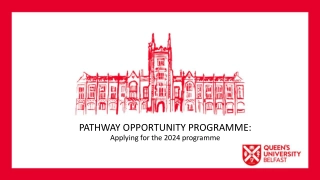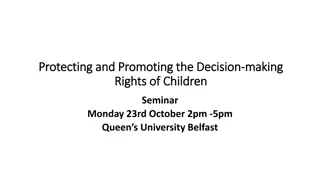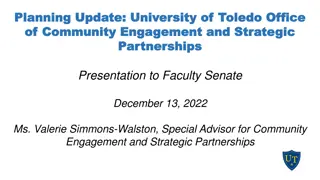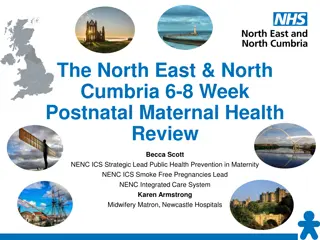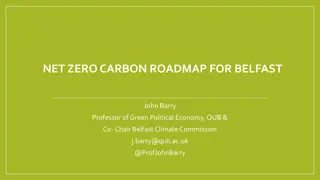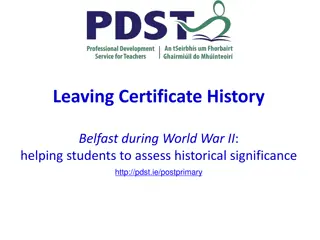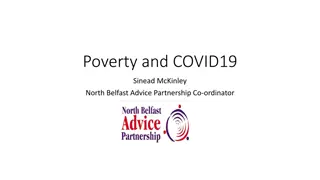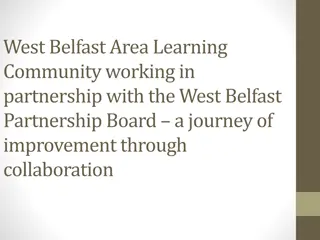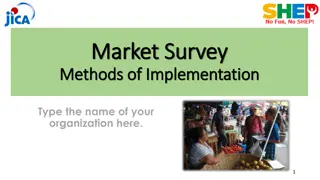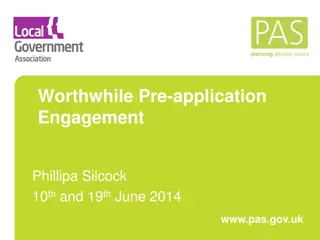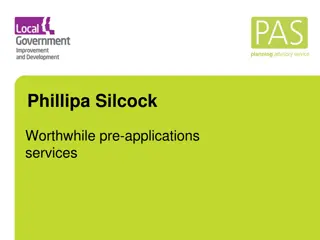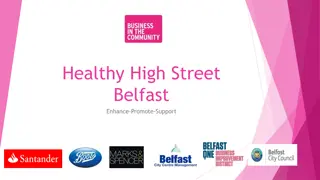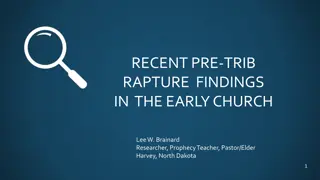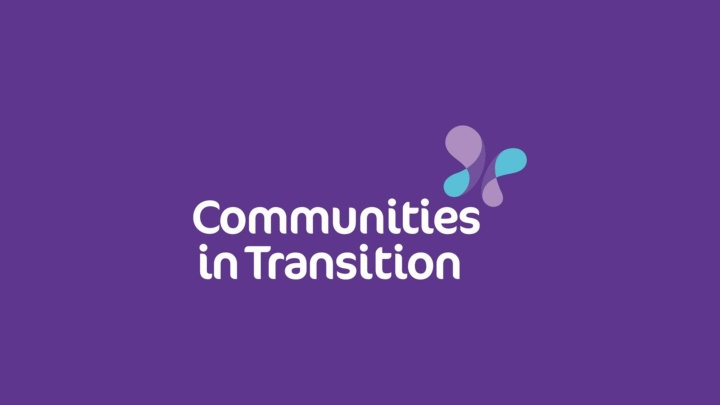
Empowering Communities: North Belfast Area Transition Framework
"Discover how the Communities in Transition project aims to support communities in North Belfast impacted by paramilitarism and criminality. Learn about the area-based approach focusing on 8 specific areas for lasting change and empowerment through collaborative efforts."
Download Presentation

Please find below an Image/Link to download the presentation.
The content on the website is provided AS IS for your information and personal use only. It may not be sold, licensed, or shared on other websites without obtaining consent from the author. If you encounter any issues during the download, it is possible that the publisher has removed the file from their server.
You are allowed to download the files provided on this website for personal or commercial use, subject to the condition that they are used lawfully. All files are the property of their respective owners.
The content on the website is provided AS IS for your information and personal use only. It may not be sold, licensed, or shared on other websites without obtaining consent from the author.
E N D
Presentation Transcript
Communities in Transition North Belfast Area Framework
North Belfast Pre Market Engagement CIT Phase 2 Ardoyne & New Lodge 7 May 2021
Communities in Transition Context Executive Action Plan on Tackling Paramilitary Activity, Criminality and Organised Crime (July 2016) contains 38 actions to be delivered by various Departments and agencies. The Executive Office is leading delivery of Action B4: The Executive should establish a fund to support ambitious initiatives aimed at building capacity in communities in transition, including through developing partnerships across civil society and across community divisions.
The Purpose of Communities in Transition The Communities in Transition Project is designed to support and empower those communities which have been most impacted by paramilitarism, criminality and ongoing coercive control. It is intended to strengthen links within communities and between community based organisations and statutory providers. The Project is designed to reduce vulnerabilities and narrow the ground which is exploited by paramilitaries and criminal elements. The issues we are all trying to resolve are complex and sensitive, it is only by working in partnership together that we will achieve a lasting change in communities.
Area based approach The Communities in Transition Project has taken an area based approach and is focusing delivery in 8 areas. These are: Shankill (including Woodvale) East Belfast (The Mount & Ballymacarrett North Belfast (New Lodge & Ardoyne) Lurgan/Craigavon (Kilwilkie & Drumgask) Carrickfergus/Larne (Northland & Castlemara and Antiville & Kilwaughter) North Down (Kilcooley & Rathgill) Derry~Londonderry (Brandywell & Creggan) West Belfast (Lower Falls, Twinbrook, Poleglass, Upper Springfield, Turf Lodge & Ballymurphy)
Area based approach While there may be a number of individual projects being delivered within each area, these should be delivered in a joined up and collaborative way to affect change across the whole area. Pace of delivery across the CIT sites should meet the needs and capacity of the community taking more time in one area should not slow progress in another. An element of delivery in each project can take place in neighbouring Areas of Influence, where it is clear that there is a significant impact on the core CIT area. We are aware that there are other areas which could be considered as CIT areas we will continue to work with Ministers and consider options to expand the approach.
Local Co-ordination During our consultation process we heard that communities can at times find it difficult to access government departments, agencies, etc. The Communities in Transition Team will continue to support delivery at a local level through our local co-ordination teams which were implemented during the first phase of the Project. As we move out of COVID restrictions, the local teams will be more visible within your local area. Offices and space for meetings have been leased in all 8 CIT areas
Behaviours Framework As a safeguard to ensure that funding through the Project supports only those initiatives which support the overall goals of the Tackling Paramilitarism Programme, a Behaviours Framework has been developed (which is based on the updated Ministerial Code of Conduct) and has been implemented during the first phase of CIT. The Behaviours Framework includes positive affirmation that delivery partners are committed to non-violence, to upholding the rule of law, and to working collaboratively, among others. Agreeing to the Behaviours Framework is a requirement for any organisation involved in the Communities in Transition project. A breach of the Framework may result in the termination of the project.
Theory of Change Discussions that we had with communities during the initial stages of the Project highlighted three key challenges which we should ultimately seek to address: Factors which relate to how paramilitary organisations continue to recruit members; Factors which allow paramilitary organisations to continue to legitimise their existence; and Factors which allow paramilitary organisations to claim to speak for and exert coercive control in an area. No single project can directly address these factors alone, but taken together they can start to narrow the ground which is exploited by paramilitaries and criminal elements.
Theory of Change Engagement around these issues identified a number of themes for intervention. Health & Wellbeing: Acceptance that drugs and addiction were key drivers for exploitation of communities and recruitment of individuals. Early signs of issues are often difficult to spot and interventions can come too late. Community Safety: Low levels of confidence in the PSNI and lack of understanding of the criminal justice system can lead to an adversarial relationship which can see others claim to police communities. Cultural activities: Widespread perception that apparent dominance of paramilitary involvement in cultural activities reinforces level of control they have in areas.
Theory of Change Youth provision: Young people were noted as being particularly at risk of being drawn into criminal behaviour in all 8 areas even though there is significant funding of statutory and community based youth interventions. Community Development: Capacity in some areas is particularly low or fragmented which creates a void where more malign elements can step in to claim to speak for the community. Personal Transition: A challenging theme which seeks to support those who are most at risk of becoming involved in paramilitary or criminal behaviour. There is an acceptance though that these individuals often present with complex issues and need significant tailored support from numerous agencies
Theory of Change Support Ex-Prisoner Supports: Despite commitments over the past 20+ years, there is a sense that members of the ex-prisoner community and their families have not been able to fully re-integrate to society. There is a risk that criminal elements could exploit this perception by claiming that peaceful means have not accrued benefits for those involved. Restorative Practice: Broad support across all 8 areas for more use of restorative methodologies including schools, statutory bodies, etc. to prevent the escalation of local issues. These themes are varied and don t apply in all areas. Interventions are tailored to meet the priorities within individual areas.
Theory of Change Interventions supported through the Communities in Transition are focused on these core themes and how impact can be achieved through them. The approach taken in developing projects has three core elements: Increasing participation: Empowering more people to take an active role in community life, increasing the agency of voice of the community overall. Developing skills: Building the skills, knowledge and confidence of those who live and work in these communities. Improving collaboration: Appreciate and build on positive work within communities with support from statutory bodies to achieve sustained impacts.
Achieving Impact It is the combination of what we deliver and how we deliver it that will achieve a lasting impact we recognise that this will take time and progress through a number of stages. Enable: Project activities are supported to ensure that the community is fully involved in addressing underlying and barriers to participation. Empower: Projects will take an assets based approach. Opportunities will be sought to support local engagement initiatives and build connections with other funders. Embed: Good practice identified through the Project is sustained to transition communities into confident, resilient, accessible places free from coercive control.
Achieving Impact Projects supported through the Communities in Transition Project should be clearly focused on these issues and these core themes. We must all continue to challenge ourselves throughout delivery to ensure that the activities we are involved in have the potential to address the underlying issues and achieve positive outcomes. There will be more qualitative evaluations across the areas of focus on an ongoing basis during this phase to assess how we are changing areas. The Project will link and be asked to demonstrate impact to the Tackling Paramilitarism Programme benefit Increase in Community Resilience
Communication With thanks to feedback from our current delivery partners and wider stakeholders, we have developed a core Communities in Transition brand that will be implemented from the start of all Phase 2 projects. The branding will help improve visibility of the Project across local areas and ensure it has a clear and distinct presence. A communications protocol will form part of new contracts to ensure the positive impacts being achieved by projects are recognised and celebrated.
What were the priorities in North Belfast? Difference in Capacity of local community and voluntary groups Health & Wellbeing issues identified as a driver for criminality, particularly in relation to drug dealing, extortion and illegal money lending Community Safety and Policing issues confidence in local policing low and many felt it difficult to get local issues resolved
What were the priorities in North Belfast? The local environment is dominated by images, symbols and structures of the past, normalising the presence of paramilitary organisations and the community identified a number of unused spaces that attract anti-social behaviour Need for Restorative Practice and Restorative Justice to empower communities to take an active role in resolving local issues Isolation and marginalisation of the Ex-Prisoner community
Delivery during Phase 1 During Phase 1 the following projects were delivered: Community Development led by Ashton Community Trust Health and Wellbeing - led by Ashton Community Trust Community Safety - led by Ashton Community Trust Urban Regeneration - led by Ashton Community Trust Regional Restorative Practice led by CRJI Regional Personal Transition - led by Tar Isteach
Tackling Paramilitary Activity, Criminality and Organised Crime Programme The Communities in Transition Project is just one aspect of the NI Executive s Action Plan on Tackling Paramilitary Activity, Criminality and Organised Crime. The Programme funds a wide variety of activity, such as policing responses, dedicated women s programmes, and a number of youth interventions to name a few. Achieving a lasting impact on these issues will require all parts of the Programme working together.
Phase 2 Overview In July 2020, the NI Executive agreed in principle that subject to budget availability the Tackling Paramilitary Activity, Criminality and Organised Crime Programme should be extended to support delivery from April 2021 March 2024. Following discussions between the NI Executive and HMT a budget for the Programme was confirmed in late February 2021. The Communities in Transition Project will be supported through a contribution of 10m over three years. We will continue to work with Ministers to identify other funds that could be accessed to augment this allocation and support further delivery.
Plans for North Belfast Phase 2 Health & Wellbeing Community Safety & Policing Youth The following projects were commissioned in Phase I and have slightly longer contracts which will continue into Phase II. Regional Restorative Practice Regional Personal Transition
Health & Wellbeing Provide ongoing development and support to community champions and befrienders recruited in phase 1 to play a positive role in the community. Include flexibility for the delivery partner to establish the key health and wellbeing issues in the community and respond appropriately. Provide H&W interventions from Healthy North Belfast Action Plan Estimated contract value - 124k per annum
Community Safety & Policing Phase 2 of the project will: Provide support to continue the work of the community safety forum in the New Lodge, whilst creating a new forum in Ardoyne. Recruit new volunteers to both forum s Address issues identified from the phase 1 action plan Estimated Contract value - 87k per annum
Youth Project Phase 2 will give consideration to: A Youth Practitioners Forum. the Forum should include all youth providers including EA, Voluntary and Community Sector Youth providers, Faith Based organisations and other key stakeholders such as BCC. Funding will also be made available for wraparound interventions for those young people most at risk and not engaged with youth services, based on individual need.
Ex-prisoners support programme Project will continue until March 2022 and is currently: Working towards de-romanticizing the past and providing ex-prisoners in the community an opportunity to demonstrate their positive contribution to society Providing support services including advocacy, welfare rights and mental health support Contract value - 110,000 (covers 4 areas)
Restorative Practice The Regional Restorative Practice Project runs until August 2021. Named the STARS (Striving Towards A Restorative Society) Programme, it has been delivered across all 8 CIT areas of focus. A separate engagement process will take place over the coming months to establish the key features and timings for a future version of this important initiative.
Format of Tender Response AC1: Understanding of the Community Context AC2: Key Personnel Experience AC3: Methodology AC4: Project Management Approach. This now also includes an optional section on forming partnerships and describing the roles of various partners in project delivery
Forming Partnerships & Consortia The Communities in Transition Project would welcome the formation of partnerships or consortia to assist in project delivery. It is not essential to submit bids in partnership with other organisations, only if it aids the project in a meaningful way. Partners do not have to have attended this session, the tender process is open to any eligible organisation. Contact details to be shared after this session.
Tender Process Tenders will be advertised on eTenders NI in mid-May. Anyone who has expressed an interest in the project will receive a notification when the projects have been listed. Tenders will be open for 4 weeks. Evaluation will take place within 2 weeks of the closing date of each tender opportunity. Project commencement is July 2021
eTenders NI All Tender opportunities will be advertised on eTendersNI, the public procurement portal used by public sector bodies in NI. Any organisation can register on the portal at https://etendersni.gov.uk/ A user guide on registering for eTendersNI has been developed by the team in TEO. Further support can be provided through the TEO team.
Questions & Answers


